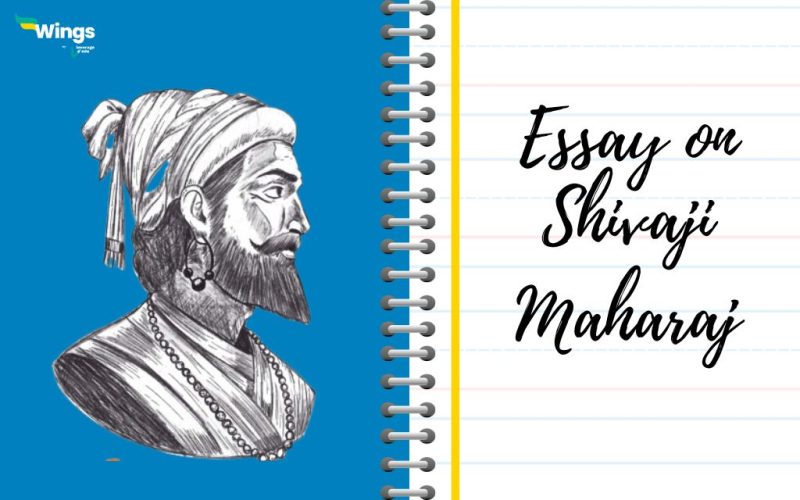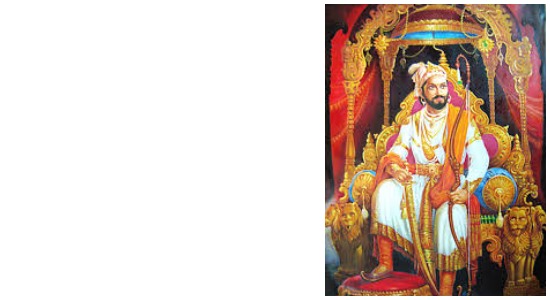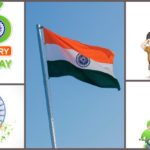

45,000+ students realised their study abroad dream with us. Take the first step today
Meet top uk universities from the comfort of your home, here’s your new year gift, one app for all your, study abroad needs, start your journey, track your progress, grow with the community and so much more.

Verification Code
An OTP has been sent to your registered mobile no. Please verify

Thanks for your comment !
Our team will review it before it's shown to our readers.

- School Education /
Essay on Shivaji Maharaj: Free Samples for Students in English

- Updated on
- March 12, 2024

Essay on Shivaji Maharaj: Chhatrapati Shivaji was a 17th-century Maratha warrior who laid the foundation of the Maratha Empire in Western India. He was regarded as a fearless warrior and an innovative military tactician who stood against his enemies with great valour. His hostilities and alliance with the mighty Mughal Empire are household tales where he stood for his motherland and expanded the Maratha sphere by capturing several forts in the region. Today we will discuss everything in the essay on Shivaji Maharaj in detail.
Table of Contents
- 1 About Chhatrapati Shivaji Maharaj
- 2 Essay on Shivaji Maharaj in 200 Words
- 3 Essay on Shivaji Maharaj in 300 Words
Check out our 200+ Essay Topics for School Students in English
About Chhatrapati Shivaji Maharaj
Chhatrapati Shivaji Maharaj was a Maratha warrior who founded the Maratha Empire in 1674. He was born in the hill fort of Shivneri , today’s Pune district, in 1630. At the age of 16, Shivaji successfully captured the Torna Fort and seized a large treasure. The following years brought him a lot of success when he managed to capture several forts of the Bijapur ruler.
The battle between Shivaji and Afzal Khan is one of the most popular events in the history of the Maratha Empire. In 1657, the Bijapur ruler sent Afzal Khan to arrest Shivaji. Afzal Khan, with a strong cavalry, marched against Shivaji, but Shivaji with his military tactics and familiar geography managed to outsmart Afzal Khan and killed him at Pratapgad Fort on 10th November 1658.
Shivaji Maharaj was formally crowned Chhatrapati in 1674 at Raigard Fort . Chhatrapati is an imperial title, meaning the monarch or head of state.
Also Read: Mughal Emperor Jahangir
Essay on Shivaji Maharaj in 200 Words
Shivaji Maharaj was a great Maratha warrior. He is regarded as the founder of the Maratha Empire and was formally crowned as the Head of the State in 1670 at Raigad Fort. His leadership, military prowess, and administrative acumen have inspired generations of Indians and continue to be celebrated even today.
Shivaji’s vision of establishing a sovereign Maratha state based on principles of justice, equality, and good governance became the cornerstone of his reign. His military campaigns were not merely about expansion but were driven by a sense of protecting the rights and dignity of his subjects.
The strategic brilliance of Shivaji Maharaj is evident in his guerrilla warfare tactics, which he employed effectively against the powerful Mughal and Adil Shahi forces. Despite numerous challenges, Shivaji’s unwavering determination and tactical genius enabled him to carve out a significant empire that stood as a bulwark against foreign aggression. Shivaji’s legacy serves as a reminder of the power of determination, the importance of good governance, and the significance of preserving one’s cultural heritage while embracing progress and modernity.
Shivaji’s name is a perfect example of courage, the spirit of independence, and an inspiration for generations to come, reminding us of the power of resilience and the pursuit of justice and equality for all.
Essay on Shivaji Maharaj in 300 Words
Born in 1630 at the Shivneri Fort, Shivaji Maharaj is regarded as one of the most important rulers in Indian history . At the age of 16, Shivaji began his military career by capturing the forts of the local Bijapur sultan. First, the Adil Shahi Sultanate and then the mighty Mughal Empire faced several challenges from the oppressive rulers.
He overcame every difficulty that stood in his way with great valour and courage and thus laid the foundation of a sovereign Maratha state that prioritized the welfare of its people. His military skills were evident in his strategic warfare techniques and the establishment of a strong naval force. Through his guerrilla warfare tactics, he successfully resisted the formidable Mughal army, leaving a lasting impact on the Deccan region.
Shivaji’s administrative capabilities were equally noteworthy. He fostered a just and inclusive governance system, encouraging local self-governance, efficient revenue management, and the promotion of trade and commerce. His policies laid the foundation for a prosperous and culturally vibrant Maratha society. Shivaji Maharaj’s emphasis on the preservation of cultural heritage and the empowerment of his subjects, irrespective of their backgrounds, remains a guiding principle in modern India.
His legacy is not confined to the pages of history but continues to shape contemporary values. He is celebrated for his unwavering commitment to justice, equality, and good governance. His tale of triumph against all odds serves as an inspiration for individuals and leaders worldwide, underscoring the power of determination, resilience, and the pursuit of justice.
His life is a testament to the indomitable spirit of an individual who challenged the status quo and established a legacy of courage and visionary leadership. His contributions to Indian history continue to resonate, highlighting the importance of upholding one’s cultural identity while striving for progress and justice.
Also Read: Essay on Athletics in 100, 200 and 300 Words
To write an essay on Shivaji Maharaj, you need to describe his early life, his career objectives, the battles he fought and the challenges he faced from both outside and inside. He was known as one of the greatest Indian rulers, who carved out an independent Maratha state from the Mughal Empire and the Adil Shahis of Bijapur. From his first fort capture at the age of 16 to his coronation in 1670, everything he did was a major step in turning the Maratha Kingdom into an Empire.
Chhatrapati Shivaji was an Indian warrior who laid the foundation of the Maratha Empire in 1670 at his Raigad Fort. He was regarded as a fearless warrior and an innovative military tactician who stood against his enemies with great valour. His hostilities and alliance with the mighty Mughal Empire are household tales where he stood for his motherland and expanded the Maratha sphere by capturing several forts in the region.
Shivaji Maharaj was born in 1630 at the Shivneri fort, in modern-day Pune.
Check out our Popular Essay Topics for Students
For more information on such interesting topics, visit our essay writing page and follow Leverage Edu .
Shiva Tyagi
With an experience of over a year, I've developed a passion for writing blogs on wide range of topics. I am mostly inspired from topics related to social and environmental fields, where you come up with a positive outcome.
Leave a Reply Cancel reply
Save my name, email, and website in this browser for the next time I comment.
Contact no. *

Connect With Us
45,000+ students realised their study abroad dream with us. take the first step today..

Resend OTP in

Need help with?
Study abroad.
UK, Canada, US & More
IELTS, GRE, GMAT & More
Scholarship, Loans & Forex
Country Preference
New Zealand
Which English test are you planning to take?
Which academic test are you planning to take.
Not Sure yet
When are you planning to take the exam?
Already booked my exam slot
Within 2 Months
Want to learn about the test
Which Degree do you wish to pursue?
When do you want to start studying abroad.
January 2025
September 2025
What is your budget to study abroad?

How would you describe this article ?
Please rate this article
We would like to hear more.
Have something on your mind?

Make your study abroad dream a reality in January 2022 with
India's Biggest Virtual University Fair


Essex Direct Admission Day
Why attend .

Don't Miss Out
Essay on Chhatrapati Shivaji Maharaj in English (150, 200, 300, 400 Words)

Shivaji Maharaj, often referred to as the "Father of the Indian Navy" and the founder of the Maratha Empire stands as an iconic figure in Indian history. Born in 1630, this visionary leader became Chhatrapati Shivaji Maharaj, showcasing exceptional military prowess, administrative acumen, and patriotism. Hailing from the Bhonsle clan, Shivaji carved a significant niche for himself in the tumultuous landscape of medieval India. His birth year, 1674, marked the establishment of the Maratha Kingdom, a pivotal moment in the history of the Indian subcontinent. The life and legacy of Shivaji Maharaj have become subjects of admiration and inspiration, prompting countless essays and articles that delve into the multifaceted dimensions of his rule. Scholars and historians continue to explore and highlight his military strategies, administrative innovations, and his commitment to the welfare of his subjects. This article aims to provide a comprehensive overview of Chhatrapati Shivaji Maharaj's life, exploring his birth, rise to power, and enduring impact on the socio-political fabric of India. By delving into the rich tapestry of his reign, this piece seeks to unravel the layers of Shivaji Maharaj's persona, examining the indelible mark he left on Indian history and the enduring lessons that can be gleaned from the life of this remarkable Indian king.
Why is the Essay on Shivaji Maharaj Important for Your Exams?
The essay on Shivaji Maharaj holds immense significance for students preparing for exams, particularly in the context of Indian history and culture. Chhatrapati Shivaji Maharaj's life and reign provide a captivating narrative that encompasses not only military conquests but also strategic governance, social reforms, and an unwavering commitment to the welfare of his people. As an iconic figure in Indian history, understanding Shivaji Maharaj's legacy is crucial for a comprehensive grasp of the socio-political dynamics during his time and the lasting impact he had on the Indian subcontinent.
One of the primary reasons why an essay on Shivaji Maharaj is important for exams is the historical context it offers. His birth in 1630 and the establishment of the Maratha Kingdom in 1674 marked a pivotal period in Indian history. The turbulent political landscape, marked by the Mughal Empire and regional conflicts, set the stage for Shivaji Maharaj's rise to power. Understanding this context allows students to grasp the intricacies of medieval Indian history, showcasing the significance of regional powers in shaping the destiny of the subcontinent.
Moreover, Chhatrapati Shivaji Maharaj's military strategies and administrative innovations provide a wealth of material for examination essays. His guerrilla warfare tactics, naval prowess, and the establishment of a strong administrative system are exemplary components of his leadership. Analyzing these aspects not only allows students to showcase their understanding of military and administrative history but also draws parallels with contemporary governance and strategic thinking.
The essay on Shivaji Maharaj also serves as a lens through which students can explore cultural and social dimensions. Shivaji Maharaj's commitment to justice, religious tolerance, and social welfare initiatives underscore the broader impact of his rule beyond the battlefield. Examining his policies towards various communities, his encouragement of art and literature, and his efforts to foster a sense of unity among diverse populations provide students with insights into the social fabric of his time.
In conclusion, the importance of an essay on Shivaji Maharaj for exams lies in its ability to encapsulate a holistic understanding of Indian history, military strategies, governance, and societal dynamics. By delving into the life and legacy of this iconic king, students not only gain historical insights but also develop critical thinking skills by drawing connections between the past and present. This multifaceted exploration makes the essay on Shivaji Maharaj a valuable resource for academic examinations, fostering a nuanced appreciation for the rich tapestry of India's historical narrative.
Long and Short Essay on Shivaji Maharaj
Essay on shivaji maharaj 1 (100 words) , essay on shivaji maharaj 2 (150 words), essay on shivaji maharaj 3 (200 words) , essay on shivaji maharaj 4 (250 words), essay on shivaji maharaj 5 (300 words), essay on shivaji maharaj 6 (500 words) , esaral gurukul.
- JEE Coaching in Kota
- NEET Coaching in Kota
- NEET Question Paper
- NEET 2024 Question Paper
- NEET 2024 Exam Date
- JEE Main 2025
- JEE Main Question Paper
- JEE Main 2024 Question Paper
- JEE Main 2023 Question Paper
- JEE Main 2022 Question Paper
- JEE Main 2021 Question Paper
JEE Advanced
- JEE Advanced Question Paper
- JEE Advanced 2023 Question Paper
Our Telegram Channel
- eSaral NEET
- eSaral Class 9-10
All Study Material
Amplifying Ideas
- Food and Stay
- Entertainment
- Collaborate
- Search for: Search

Essay On Shivaji Maharaj In English – Chhatrapati Shivaji

Indian history is full of the stories of valour of its men and women. One such hero was the Maratha king Shivaji. Here we present an essay on Shivaji Maharaj which will be useful for students to pen their own essay on the subject. Whether you are looking for a short essay on Shivaji Maharaj or a few lines on Shivaji Maharaj, you shall find this post useful.
Table of Contents
Essay On Shivaji Maharaj In English
The essay on Shivaji Maharaj in English is given in 3 different forms to suit different students. There is a long essay for senior students, a paragraph on Shivaji, and 10 lines on Shivaji Maharaj for junior students . You can use any of these based on your requirement and write an essay on Shivaji Maharaj in your own words.
Essay On Shivaji Maharaj | 10 Lines On Shivaji Maharaj

- Chhatrapati Shivaji Maharaj was a brave king who established the Maratha empire
- Shivaji was born inside the fort town of Shivneri in Maharashtra on 19, February 1627
- Shivaji’s parents were Shahaji Bhonsle and his mother was Jijabai Bhonsle
- Shivaji was brave and even as a boy of 15, he captured three forts
- Shivaji was crowned as Chhatrapati Shivaji in the fort of Raigad in the year 1674
- Shivaji was very religious and had been brought up listening to Hindu scriptures by his mother Jijabai
- Though Shivaji was a devout Hindu he was tolerant and supported other religions too
- Chhatrapati Shivaji died in the year 1680 from an illness
- Sambhaji Bhosale, Shivaji’s eldest son succeeded him as the Chhatrapati of the Maratha Empire
- February 19 is celebrated as Chhatrapati Shivaji Jayanti to commemorate the birth of the brave Maratha king
Essay On Shivaji Maharaj | Paragraph On Shivaji

Shivaji is one of the shining stars of Indian history. The tales of his bravery and valour are legendary and have been inspiring Indians for generations. Shivaji was born Shivaji Bhonsale to Shahaji Bhonsale and Jijabai in Shivneri on the 19th of February, 1630. His military career took off at the young age of 15 when he captured the Torna Fort, Chakan Fort, and the Kondana fort.
Shivaji founded the Maratha Empire with its capital as Raigad and expanded it by capturing one fort after another. He fought with the Mughal Empire, the British and other feudal powers to establish his kingdom. He was known to be a just ruler who was also a very devout Hindu. Shivaji was crowned Chhatrapati Shivaji in the year 1674 at Raigad Fort. He died in the year 1680 due to an illness. His eldest son Sambhaji succeeded him as the Chhatrapati. !9th February is celebrated as Chhatrapati Shivaji Jayanti to commemorate his birth anniversary.
Essay On Shivaji Maharaj In English | Long Essay On Shivaji

Raigad in Maharashtra is a historical place where the memory of the brave warrior king Shivaji still lives on. At a distance of about 132 kilometres is Raigad, an impressive fort that stands atop a hill at a height of about 2,700 feet. Within the fort are the ruins of the once-thriving capital of the Maratha Empire. The royal palace of Shivaji used to be inside the fort. However, the palace is completely destroyed and only ruins in the form of pillars remain. The tomb of Shivaji is inside the fort and along with him is the tomb of his faithful dog named Waghya.
Shivaji was born to Shahaji Bhonsale and Jijabai in the fortified town of Shivneri on the 19th of February, 1630. Shivaji’s father was a General who worked for the Deccan Sultanate rulers. His mother Jijabai was a very pious lady who inculcated religious values in the young Shivaji from an early age.
Shivaji who was born into a family of warriors showed his valour from an early age. He was only 15 when he captured three forts, namely, Torna Fort, Chakan Fort, and the Kondana fort. He slowly expanded his kingdom capturing fort after fort and it soon spread across Western and Central India. This was the Maratha Empire established by Shivaji who was crowned as Chhatrapati Shivaji at Raigad in the year 1674.
Shivaji Maharaj’s military exploits are legendary. He fought the Mughal Empire, Bijapur Sultanate, Golconda Sultanate, and the British. One of his famous exploits is his encounter with Afzal Khan, a General of the Bijapur Sultanate. A battle between the forces of Shivaji and that of the Bijapur Sultanate led by Afzal Khand had reached a standoff. Afzal Khan then suggested a personal meeting with Shivaji to sort out the issue. The condition was that each leader would come unarmed and with just one attendant.
The shrewd Shivaji got wind of the evil designs of Afzal Khan and wore armour under his robes. He also armed himself secretly with a tiger claw and a dagger. His suspicion proved correct and he was attacked. But the brave Shivaji killed Afzal Khan with the tiger-claw and escaped.
The heroic Chhatrapati Shivaji breathed his last, after suffering from an illness, inside the Raigad Fort, on the 3rd of April, 1980. The tales of his valour still remain to inspire his countrymen for years to come.
We hope you liked our essay on Shivaji Maharaj in English and hope that it helps you to write about Shivaji in your own words. Do check out some of our other essays on, Mahatma Gandhi , Teachers Day , Republic Day , and many others. Also please subscribe to our blog for more useful posts.

Thanks for visiting our site nirvandiaries.com and taking the time to read this post.
If you wish to collaborate or work with us then reach us at [email protected]
We’d love it if you’d comment by sharing your thoughts on this post and share this post on social media and with your friends.
Follow our journey on our social media channels: Facebook Twitter Instagram Pinterest
More from our site

Leave a Comment Cancel Reply
Your email address will not be published. Required fields are marked *
Save my name, email, and website in this browser for the next time I comment.
Privacy Overview

IMAGES
VIDEO